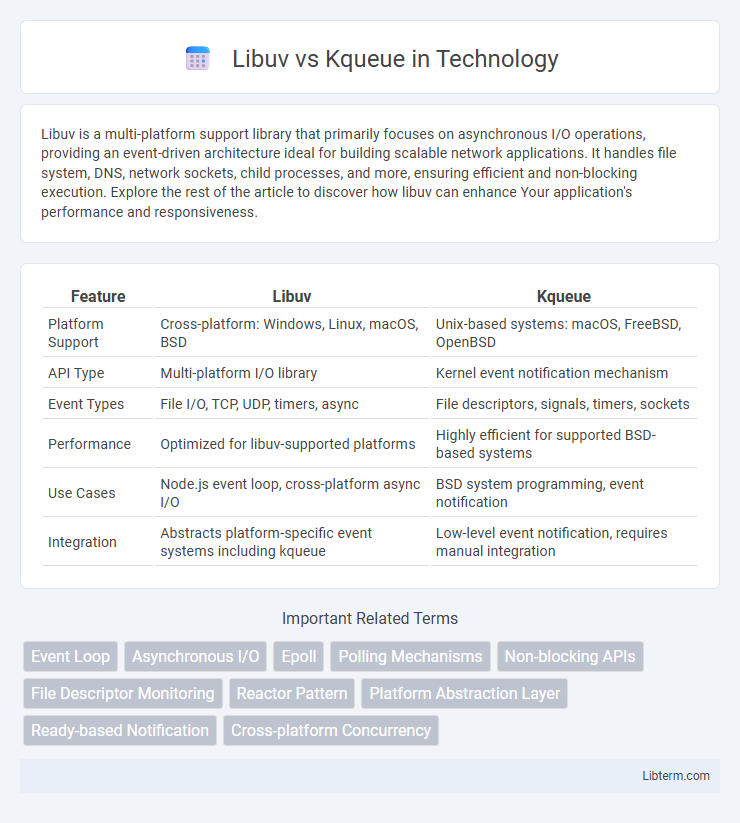Libuv is a multi-platform support library that primarily focuses on asynchronous I/O operations, providing an event-driven architecture ideal for building scalable network applications. It handles file system, DNS, network sockets, child processes, and more, ensuring efficient and non-blocking execution. Explore the rest of the article to discover how libuv can enhance Your application's performance and responsiveness.
Table of Comparison
| Feature | Libuv | Kqueue |
|---|---|---|
| Platform Support | Cross-platform: Windows, Linux, macOS, BSD | Unix-based systems: macOS, FreeBSD, OpenBSD |
| API Type | Multi-platform I/O library | Kernel event notification mechanism |
| Event Types | File I/O, TCP, UDP, timers, async | File descriptors, signals, timers, sockets |
| Performance | Optimized for libuv-supported platforms | Highly efficient for supported BSD-based systems |
| Use Cases | Node.js event loop, cross-platform async I/O | BSD system programming, event notification |
| Integration | Abstracts platform-specific event systems including kqueue | Low-level event notification, requires manual integration |
Introduction to Libuv and Kqueue
Libuv is a multi-platform support library designed to provide asynchronous I/O based on event loops, predominantly used in Node.js for non-blocking operations across different operating systems. Kqueue is a scalable event notification interface native to FreeBSD and macOS that efficiently monitors and reports changes in file descriptors, processes, and other kernel events. Libuv abstracts platform-specific event mechanisms including kqueue on BSD systems, enabling uniform asynchronous programming models on diverse environments.
Core Architecture Comparison
Libuv uses an event-driven, non-blocking I/O core architecture that abstracts various platform-specific mechanisms, including kqueue on BSD systems, to provide cross-platform asynchronous support. Kqueue operates as a native BSD kernel event notification interface, designed for efficient scalability with a filter-based event dispatch mechanism tailored for high-performance event polling. The core difference lies in libuv's multi-platform abstraction model versus kqueue's specialized, low-level event notification optimized for BSD environments.
Event Loop Mechanisms
Libuv and kqueue are both event notification mechanisms used to handle asynchronous I/O operations efficiently in event-driven programming. Libuv provides a cross-platform event loop abstraction that internally utilizes kqueue on BSD-based systems like macOS and FreeBSD, leveraging kqueue's efficient event notification system to monitor file descriptors for events such as read, write, and timers. Kqueue operates as a scalable kernel event notification mechanism that supports high-performance event loops by minimizing system calls and efficiently managing large numbers of event sources.
Platform Support and Compatibility
Libuv offers broad platform support, running seamlessly on Windows, Linux, macOS, and Unix-like systems, making it a versatile choice for cross-platform asynchronous I/O. In contrast, Kqueue is a BSD-originated I/O event notification mechanism primarily supported on FreeBSD, OpenBSD, NetBSD, and macOS, limiting its compatibility to BSD-based operating systems. Developers targeting diverse environments favor Libuv for its wide compatibility, while Kqueue excels in performance and integration within BSD ecosystems.
Performance Benchmarks
Libuv and Kqueue both offer efficient event notification mechanisms for high-performance network applications, but their performance varies based on workload and platform specifics. Kqueue, native to BSD-based systems including macOS, excels in handling large numbers of file descriptors with low latency and minimal CPU usage, making it highly performant for I/O-bound applications. Libuv, a cross-platform asynchronous I/O library, abstracts system-specific event APIs including Kqueue, offering consistent scalability and responsiveness across different environments, but may introduce slight overhead compared to using Kqueue directly.
Scalability and Concurrency
Libuv provides cross-platform asynchronous I/O with efficient event loop mechanisms, enabling high scalability and concurrency across Windows, Linux, and macOS. Kqueue, native to BSD-based systems and macOS, offers scalable event notification optimized for managing thousands of file descriptors concurrently with minimal overhead. While Kqueue excels in scalability and low-latency event handling on supported platforms, Libuv enhances concurrency by abstracting multiple backend mechanisms including Kqueue, epoll, and IOCP for broader system compatibility.
Ease of Integration and APIs
Libuv offers a cross-platform abstraction layer with a straightforward, consistent API that simplifies integration across Windows, Linux, and macOS, making it ideal for developers seeking uniform event-driven programming. Kqueue, native to BSD systems including macOS, provides a powerful but platform-specific API with more granular control over event monitoring, requiring deeper system-level knowledge for effective integration. Choosing between Libuv and Kqueue depends on the need for cross-platform compatibility versus leveraging native performance features on BSD-based systems.
Use Cases and Applications
Libuv excels in cross-platform asynchronous I/O, powering Node.js for scalable network applications and real-time data processing, while kqueue, specific to BSD-based systems like macOS and FreeBSD, is ideal for high-performance event notification in native applications. Kqueue's efficient event handling suits server software and low-level system tools requiring precise control over file descriptor monitoring and timers. Libuv's abstraction provides broader compatibility for developers targeting multiple OS environments, making it preferable for distributed systems and web services.
Community Support and Documentation
Libuv features extensive community support driven by its integral role in Node.js, boasting comprehensive documentation and active discussion forums that facilitate troubleshooting and development. Kqueue, while efficient for BSD-based systems, has more limited community engagement and sparse official documentation, which can pose challenges for developers unfamiliar with its specifics. The widespread adoption of Libuv ensures more frequent updates and contributions, making it a preferred choice for projects requiring robust support and resources.
Choosing Between Libuv and Kqueue
Choosing between Libuv and Kqueue depends on the application's cross-platform needs and performance requirements. Libuv provides a consistent, high-performance asynchronous I/O abstraction across Windows, Linux, and macOS, while Kqueue is a native event notification interface specific to BSD-based systems like macOS and FreeBSD, offering lower-level access and minimal overhead. Developers targeting multi-platform compatibility favor Libuv for its versatility, whereas Kqueue is ideal for optimizing event handling on BSD environments.
Libuv Infographic

 libterm.com
libterm.com